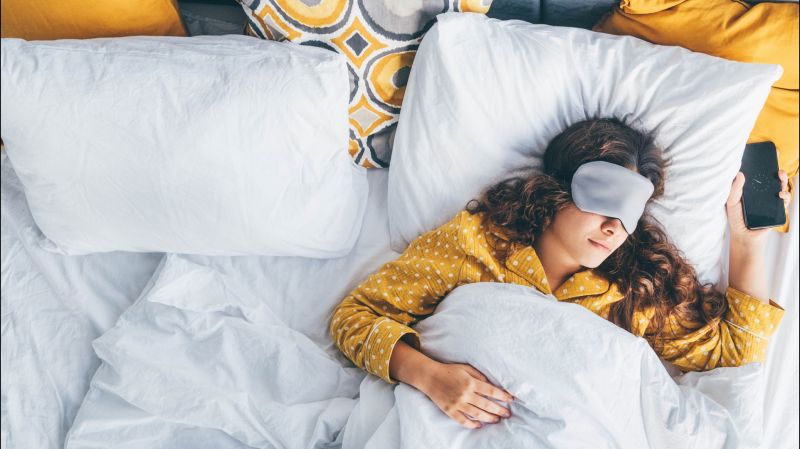The Business Case for a Good Night’s Sleep
Of all the things you do to build your career, a solid slumber might be the one that matters most

Is sleep high enough on your list of priorities? The research suggests it might not be. Surveys show that overall sleep hygiene is deteriorating in Canada, with only 16 per cent of us consistently notching a restful slumber. Nearly one-quarter of working-aged Canadians don’t get the recommended seven to nine hours. About half of Canadians sacrifice slumber when they get busy.
There are many reasons you might find yourself on Team Underslept. Maybe you’re so overextended during the day, you feel entitled to a bit of “me time” at night — a phenomenon known as revenge bedtime procrastination. Maybe you’ve embraced the “I’ll sleep when I’m dead” ethos of hustle culture — or had it imposed upon you. Maybe you just don’t think you need it.
But you do.
We know “sleep better” isn’t the most scintillating advice. It’s right up there with “eat your vegetables” and “get some exercise” in the pantheon of obvious — and, frankly, annoying — bromides about things a healthy and well-adjusted person ought to do. It’s hard to do things that are good for us all of the time. And after a long day of work, we all deserve to decompress with a few extra hours of Netflix once in a while.
But if you think your sleep habits don’t affect your professional prospects, consider this your wake-up call. Or, more accurately, your “go to bed” call. There’s a real business case for prioritizing sleep, and there’s a real opportunity cost in not getting enough sleep.
We spoke to a range of sleep experts to better understand the ROI of shut-eye.
A quick note: If you’ve been diagnosed with a sleep disorder, such as insomnia or sleep apnea, this article isn’t for you. Nor is it if your deprivation is caused by circumstantial factors like night shifts, or small children or menopause. We’re aiming to persuade people who don’t care about a good sleep, not those who can’t get it. Here are some expert-vetted resources that might help you.
Sleep makes our brains sharper
When it comes to our body’s energy consumption, our brains hog the blankets, consuming about 20 per cent of the fuel we need to get through the day, despite comprising less than two per cent of our weight. So, it’s no surprise that when we fail to regenerate our power source overnight, the effects are most acutely seen in our executive function — that is, our ability to think strategically, creatively and with a long-term focus, and to process emotions.
“When we don’t have a good night’s sleep, we don’t feel on top of our game. “That has a lot of cognitive effects,” says Judith Davidson, a psychologist, scientist-clinician and adjunct professor in the Department of Psychology at Queen’s University, who researches insomnia and its treatment in adults and runs a sleep therapy clinic called Sink into Sleep.
A tired brain simply operates less effectively than a rested one does, Davidson explains — and if you’re not personally familiar with the struggle of, say, trying to parse a complicated contract after an especially late night, research bears her out. When we’re underslept, we’re less vigilant and alert, meaning that we’re more likely to miss key details in a conversation or forget to complete a task. We find it harder to make decisions, period, much less smart or strategic ones. We’re less flexible in our thinking and less adept at solving problems in creative or innovative ways. We’re slower to react physically, and we make more errors.
Then there’s the emotional component: “There’s a real connection between a lack of sleep and our mood,” Davidson explains. “We feel lower. We’re less likely to interact with colleagues in a fun or pleasant way. We want to isolate.” We might soldier through the day and check items off our to-do lists, she says, but it will all feel a lot harder than it would were we well-rested. And, because most of us work with other people, it’s not a simple matter of carrying a cloud over our heads: When we’re tired, we’re more likely to snap at colleagues, behave unprofessionally and react in a disproportionately emotional fashion (read: bursting into tears during a relatively benign workplace conflict). Everyone has an off day, but if these instances become habitual, they can erode workplace morale and — not for nothing — taint performance reviews.

Sleep makes us more productive
Jackie Roberge, BCom’88, is on a mission to make organizations understand just how much sleep deprivation damages productivity. Roberge is a partner, leadership coach and mindfulness facilitator at Mindsmatter — and a member of the Canadian Sleep Society — whose interest in rest has deeply personal roots. She lived with insomnia for years and saw first-hand how acutely it affected her professional output.
“Sleep is the elephant in the boardroom,” Roberge says. “Few leaders are talking about it, but people are tired. They’re burning the midnight oil and pushing through the day. It’s a cultural thing in many organizations. But it really doesn’t serve anyone in the mid- and long-term.”
Many fixtures of a modern workday serve to mask sleep deprivation, Roberge says: caffeine (which temporarily blocks fatigue receptors); exercise (which stimulates cortisol and briefly boosts energy); even stress (which releases adrenaline). It’s easy to create the appearance that a lot is getting done. But in reality, poor sleep can be a serious productivity killer.
When we are tired, our neurons go into overdrive, which can manifest in physical sluggishness, as well as the aforementioned cognitive confusion and emotional volatility — none of which is conducive to effective work. University of Washington management professor Christopher Barnes has found that on the day after the advent of Daylight Saving Time — which he dubs “Sleepy Monday” — employees waste more time and behave more recklessly after losing, on average, just 40 minutes of slumber from springing forward. That’s one day, and a relatively minor decrease. Imagine the cumulative effect of months, or years, of getting two or three fewer hours than you should every night.
Indeed, the insufficient sleep habits of Canadians are thought to cost the national economy up to $21.4 billion and more than 80,000 working days every year. Furthermore, one U.S. study found that lack of sleep cost employers more than US$2,000 per employee annually in lost productivity and absenteeism. “Basically, the cost of sleeplessness is being carried by corporations,” Roberge says. “And I don’t think many of them realize it.”
Sleep gives us longevity
Of all the reasons tennis great Roger Federer was able to perform at the top of his game for two decades, there’s one he considers his secret weapon: “I believe it’s really the sleep that gives you energy down the road,” he said after one 2015 win. At his peak, he clocked 11 or 12 hours a night, prioritizing rest over pretty much everything else.
Now, not everyone with this mindset will achieve the kind of results Federer did, but according to sleep expert Trish Krause, there’s a definite connection between sleep and longevity. Krause was a self-described “poor sleeper” for most of her life, until she burned out from her corporate job, started to address the varied nutritional, habitual and stress-management issues underpinning her insomnia, and changed careers.
Today, Krause is the founder and CEO of Bite Out Of Life Wellness, where she coaches busy professionals on how to live healthier lives — including getting better sleep — and gets a first-hand view into just how easy it is for overextended folks to deprioritize sleep. When she sees it happening, she’s quick to offer some tough love: “You just can’t run away from poor sleep in the long term,” she explains. “If you think you’re special, you’re not. This is how the human body works. You can go on for a while, but eventually you’ll have to pay that debt back. And, usually, the debt gets paid back with health.”
Indeed, poor sleep hygiene is correlated to many long-term and/or chronic health conditions, including cardiovascular disease, diabetes, obesity, high blood pressure, depression and anxiety disorders. If sleep really is, as neuroscientist and Why We Sleep author Matthew Walker has said, “the Swiss Army knife of good health,” it would seem to behoove anyone who wants a long and healthy life — and a long and healthy career — to keep it at the top of the to-do list.
Of course, that can take some effort. “Even with a lot of talk about the importance of sleep, people really are quick to slough it off,” Krause says. “But you really do have to pay attention to it. A lack of sleep can drain the bejesus out of you. And good sleep? That can be a superpower.”